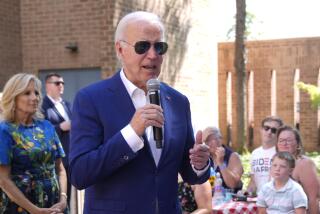Sexual molestation allegation puts Alabama Senate seat in play as Moore’s GOP support fades

Reporting from Birmingham, Ala. — Pressure mounted Friday on U.S. Senate candidate Roy Moore of Alabama to drop out of the race amid growing Republican angst over potential damage to the party after a woman accused him of molesting her when she was 14.
GOP senators began pulling their endorsements of Moore as it became more apparent that his Democratic rival, Doug Jones, could now win a Senate seat in one of America’s most reliably Republican states.
Moore appeared to weaken his standing in a radio interview when he did not deny dating teenage girls when he was in his 30s.
In Alabama, voters were torn between loyalty to the widely admired religious-right firebrand and unease over the new molestation allegations that undercut Moore’s conservative image.
The turmoil made for awkward lunch-hour conversation. At Niki’s West, a popular Southern-style buffet joint in downtown Birmingham, potential voters said the last thing anyone wanted to talk about on this crisp fall day was “all that sex stuff,” as one man put it, referring to allegations in the Washington Post that Moore had a sexual encounter with the 14-year-old girl when he was 32.
But another diner, Gil Franks, an Alabama state prison worker, conceded that the disturbing report had him rethinking whether he could vote Republican, as he usually does, in the Dec. 12 special election pitting Moore against Democrat Doug Jones.
“I think we need some morality and ethics in politics,” Franks said.
GOP leaders fear that Moore — whose open bigotry had already put them on edge — could actually lose, and it’s unclear whether a write-in candidacy for a GOP replacement would be viable.
Loss of the seat is an ominous prospect for Republicans: The 2-seat GOP majority was already so narrow that the party has been struggling to pass major laws.
Even if he wins, Moore’s tarnished reputation will pose serious challenges for the national party.
Mitt Romney said Friday that he believed Leigh Corfman, the woman who told the Post that Moore initiated a sexual encounter with her in 1979, when she was 14.
“Innocent until proven guilty is for criminal convictions, not elections,” Romney said on Twitter, calling Corfman’s account “too serious to ignore.”
Moore, who denies ever meeting Corfman, remained defiant Friday, but his latest comments on the matter might have weakened his standing within the party.
In a radio interview Friday with Sean Hannity, Moore did not deny dating teenagers when he was in his early 30s, but said: “I don’t remember dating any girl without the permission of her mother.”
The Post reported that in addition to Corfman, Moore pursued three other women between 16 and 18 years old when he was in his 30s.
Moore admitted he knew two of the women quoted in the Post, but denied any inappropriate contact. He described one of them as a “good girl.”
“I don’t remember specific dates,” he said.
“After my return from the military,” he added, “I dated a lot of young ladies.”
After the radio interview, Republican Sens. Mike Lee of Utah and Steve Daines of Montana yanked their endorsements of Moore.
Senate GOP leader Mitch McConnell and most other top Republicans agreed that Moore should step aside, but only if there were convincing evidence that the accusations were true.
Moore’s strongest supporters, conservatives and Christians who powered his primary victory against the GOP’s establishment candidate, Sen. Luther Strange, are standing by him.
The former chief judge of the Alabama Supreme Court, Moore holds folk-hero-like stature in the state for defying the U.S. Supreme Court ruling that legalized gay marriage and, earlier, ignoring another court order to take down a Ten Commandment monument at a courthouse. One refusal cost him his job, and though voters reelected him, he was later forced to step aside.
Before the molestation charge emerged, Jones, Moore’s Democratic rival, was widely seen as a long shot for the Senate seat vacated by Jeff Sessions, now the U.S. attorney general.
Jones is the prosecutor who won convictions — decades after the crime — against Ku Klux Klan members who killed four girls in the bombing of Birmingham’s 16th Street Baptist Church in 1963 as the Civil Rights movement was gaining force.

But Democrats have not won a Senate seat here for more than 20 years. Jones’ path to victory hinged not just on turning out Democrats, but on peeling away Republicans. He needs to attract moderate and business-minded Republicans, who view Moore’s cultural appeals to the right wing as too extreme. Stephen K. Bannon, a former chief strategist to President Trump, is one of Moore’s top sponsors.
Ed Rogers, a Washington lobbyist from Alabama who was a White House aide under Presidents Reagan and George H.W. Bush, said Jones was “not a frightening figure” and now appears to hold an edge over Moore.
“It could happen: Alabama could elect a Democrat to the Senate,” Rogers said.
At Niki’s West, Nathan Pennington, who said he’s a Republican but “a Christian first,” had just finished lunch with his father. He said he wanted to learn more about Jones before making up his mind.
Franks, the prison worker, was hoping a third candidate might emerge.
“We got to get back to people doing the right thing,” he said.
Times staff writers Mascaro and Finnegan reported from Birmingham and Los Angeles, respectively.
Twitter: @finneganLAT
ALSO
Senate plan to scrap income and property tax deductions would be a blow to Californians
Is this small-town congressman from New Mexico tough enough to win Democrats the House majority?
More coverage of politics and the White House
UPDATES:
5:05 p.m.: This story has been updated with information on Moore’s radio interview and new details from Washington.
This article was originally published at 12:40 p.m.
More to Read
Get the L.A. Times Politics newsletter
Deeply reported insights into legislation, politics and policy from Sacramento, Washington and beyond. In your inbox three times per week.
You may occasionally receive promotional content from the Los Angeles Times.












